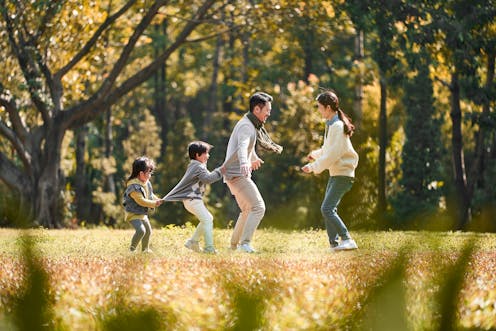A silver lining from the pandemic: how lockdowns helped kids learn the languages their parents speak

None of us is a stranger to the downsides of the pandemic. For families with kids, kindergartens and schools closed during the lockdown, and parents had to manage schooling and working from home.
Yet there is a silver lining: our research shows that, in families where a parent’s mother tongue is not the language spoken in wider society, children learned more about that language during lockdowns.
Let’s call the language these parents speak the “home language” and the language society uses the “societal language”. Take me as an example: at home I speak Shanghainese with my mum, Mandarin with dad, and Telepath with my cat. But in the community and at work, I speak English, the societal language.
To many multilingual families, our kids’ home language often comes second to the societal language, which dominates their language development as they grow up. When parents witness this transition, they fear their children will gradually lose the ability to use the language they speak. They fear that, as a consequence, their children will lose touch with their roots.
Along with my colleagues, Elisabet García González and Elizabeth Lanza, we conducted a survey of around 200 multilingual families in Norway (to be published in the journal Multilingua). Parents expressed their concerns about their children’s development of home and societal languages. For example, one said:
Since our daughter mostly speaks [home language] with her father and [societal language] with me and at kindergarten (although her father and I exclusively speak [home language] to each other), her [home language] is generally less advanced than her [societal language] […]
Multilingual children rarely use all their languages in the same contexts or with the same frequency. This is often perceived as being more or less “advanced” in one language than the other, but in reality multilingual speakers use their languages as best fits their needs.
Despite these concerns, there was a silver lining. Our study found children’s home language literacy improved during the pandemic. The parents who reported the concern above later said:
We’ve clearly noticed that her spoken [home language] has developed during the lockdown.
Another family told us:
With the two-year-old, I noticed an improvement in her [home language] vocabulary while kindergarten was closed.
What is the reason for this improvement in the home language? As one family shared:
My children started to be interested and speak more [home language] during the lockdown. Assume this is a result of (us) working from home for an international company and them hearing mum use this (home) language.
Another said:
My kids have started using more [home language] in their [societal language] speech with parents and each other during the lockdown, because they are watching more YouTube and playing Minecraft, Animal Crossing and Zelda. Words from the games are difficult to translate into [societal language].
Our statistical analyses had something even more interesting to say: the improvement of a child’s home language made their parents feel more positive about their children being multilingual. Parents see it as a source of wellbeing, especially when they notice their child is picking up their mother tongue. Overall, family relationships, resilience, cultural connection and hope are boosted even in the darkest days of the pandemic.
Is this at the expense of the societal language, one may ask? Indeed, some parents were worried about the development of kids’ societal language, especially when it was not spoken at home. Others said the societal language was still being used during the lockdown, such as in online media. One parent said:
My son is a bit behind the level of the class. He really improved his [societal language] reading during the lockdown, since we had more time to individually support him in a positive way. Before, he was much more negative.
Another family told us:
The difference (in language use) was noticeable when the kindergarten reopened. [Societal language] came back for the kids as easily as restarting to ride a bike.
The societal language is often strong in young children – sometimes so strong that it can bully the home language into a corner. The key task for many multilingual families is not so much to find a balance between the two languages, but to make sure the home language is being actively used and not being overshadowed by the societal language.
Unity is important in society. Being able to speak a common language is important, but equity and diversity are important too. The ability to speak one’s mother tongue can become a source of belonging and wellbeing.
In addition, children growing up in a culturally and linguistically diverse environment tend to be more flexible. Their neurocognitive plasticity shines across developmental domains, from language learning to music perception.
So the pandemic lockdowns were bad, but not all bad. Our kids adapt and adjust to the new environment, and can surprise us with stronger skills that make mum and dad proud.
Liquan Liu receives funding from uropean Union’s Horizon 2020 research and innovation programme under the Marie Skłodowska-Curie grant agreement No. 798658 hosted by Center for Multilingualism across the Lifespan at the University of Oslo, financed by Research Council of Norway through its Centers of Excellence funding scheme grant agreement No. 223265; and from Western Sydney University School of Psychology 20820 83181. The corresponding academic publication will be published on journal Multilingua. DOI details to be added. Co-authors are Elisabet Garcia Gonzalez and Elizabeth Lanza.
